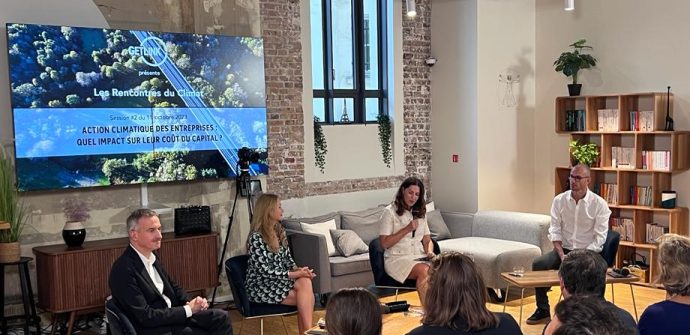Climate action by businesses: what is the impact on their cost of capital?
For the second Rencontres du Climat (climate talks) session, Getlink brought together decision-makers, analysts and business leaders to discuss the impact of climate action by businesses on their cost of capital.

The cost of capital, an essential variable for businesses
The cost of capital is of vital importance for businesses. It influences investment and is one of the main criteria studied by investors since it is linked to the rate of return required by investors to finance projects. Obtaining a lower cost of money to finance a “green” asset than to finance a “brown” asset is therefore a major lever to encourage companies to carry out this decarbonisation operation, even if it appears more costly at first sight.
“The cost of capital is of vital importance if we want to finance new projects, so we have to ask ourselves about the impact of our climate actions on the cost of our capital. At Getlink we are very committed to the ecological transition: we are 93% aligned with the European taxonomy; however carrying out ‘green’ projects costs more than carrying out ‘brown’ projects. Running our rail freight trains all over Europe on rapeseed oil residues costs more than heavy fuel oil,” said Yann Leriche, Getlink’s Chief Executive Officer.
If we are to make a success of the ecological transition, investors will have to do more to recognise the efforts made by the promoters of environmentally virtuous projects in order to create a “greenium” effect.
A lower cost of capital for green investments?
Ecological transition comes at a cost and will require significant investment. The International Energy Agency has estimated the cost at $5,000 billion by 2030, to be channelled primarily into green infrastructure and renewable energies. In the absence of a carbon tax that would put a price on the carbon emitted by businesses, the leverage of a lower cost of capital for “green” businesses is a necessity for the various economic players.
Sébastien Pouget, Professor of Finance at the TSE, refers nevertheless to several studies which show that “over the last 15 years, green businesses have had slightly lower profitability than brown businesses”. These studies are often conducted on the so-called secondary market, which is less relevant than the primary market monitored by investors.
Financing the ecological transition is therefore crucial to its success, and finance must also make the transition to redirect investment towards green activities.
The need to adapt financial rules to ecological transition
The financial sector is very concerned about the issue of ecological transition and it is “one of the best investment opportunities for our clients in future years”, said Estelle Castres, Blackrock Managing Director for France, Belgium and Luxembourg. For the financial sector, three key factors need to be taken into account in respect of ecological transition: technological innovation, consumer preference and favourable regulation.
Nevertheless, Yann Leriche believes that “finance is not evolving fast enough, and the financial toolbox is totally disconnected from the ESG toolbox. This is what led Getlink to create the decarbonised margin”. The CAPM (Capital Asset Pricing Model) is still the method used by financial investors to calculate a business’s profitability. In theory, the standard model incorporates climate issues like all other risks. However, this model increases the cost of capital in relation to non-diversifiable risk and is not suitable for investments in green activities.
These financial models need to evolve rapidly in order to take account of climate risk as a financial risk. Certain investment strategies have been put in place by financial players, such as Blackrock, which has introduced a “brown to green” strategy help investors decarbonise their investments.
Centralising initiatives and harmonising financial rules must be the next step if the ecological transition is to be supported by the sector and lead to a reduction in the cost of capital for virtuous businesses.




